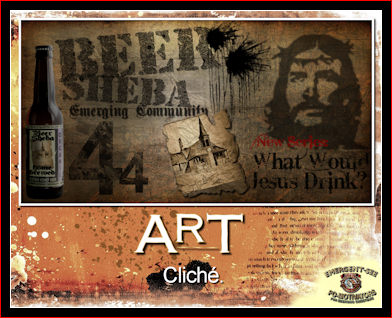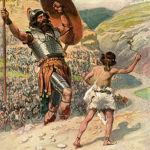The ‘priesthood Of Artists’ and Godly Criticism
In which the author copies a previous lengthy comment and fashions it into the column it should have been, about problems with “priesthood of artists” notions.
Last week I mini-ranted about Derek Webb’s interview. A lot of bloggers have been doing that. Yet most of them are the “watch-blogger” types, good and bad, and aren’t viewing Webb’s often-eyebrow-raising comments from the perspective of Christian fiction readers and writers. In short, along with some really creative insights such as we-need-to-be-more-loving and just-follow-Jesus-people, Webb seemed to say his job as artist is to show lesser Christians the light.
Anyway, a refresher — and direct quotes — is back in that catch-all column for the year’s end. Next came comments/discussion from Peter Boysen. He asked there, and elsewhere:
In what instances do you see the artist attempting to usurp the pastor’s role?
Do you think it’s possible to fix the church’s problems AND proclaim the gospel? I see your point about people who would rather nitpick than minister, but if you subscribe to the notion of the priesthood of the believer, how is someone who, in good faith, sees error in the ways of the church, usurping the pastor’s role?
Art criticism: a means to His end
My view is that we can echo the Gospel while addressing problems with the church, in our stories and other artistic creations, yet without confusing the means for the end.
Here’s what I mean. We’ve all heard of active professing Christians: on the “right,” who fight against, say, moral compromise, lack of discernment and needless pragmatism in churches, and on the “left,” who may decry the way many churches have acted legalistically and without love to, say, homosexuals, the homeless or the poor in general.Yet both sides can lapse into “ministry myopia.” Its practitioners may act as if there is only one specific set of problems to fight against, and may forget what and Who true Christians fight for — the Savior, Who, despite His often-challenging words, also promised His people “rest.”
Example: Often in my discussions with cultural “fundamentalists” (I do not mean lovers of real Biblical truth, but those who, despite good intentions, confuse favored traditions with truth) and “emergent”-style Christians alike, I like to ask a question like this: what happens if, in all your zeal to Fight the Good Fight and that’s it, you end up in Heaven and there’s nothing to fight? No poor people to feed, no heresy to condemn, nothing that makes you feel or act like a Warrior as an end to itself. All you’d have left to do is worship Christ in other ways, be it music or work, exploration, subcreation, learning and more. In such a place, when all our vestiges of self-as-”savior” are gone and there is only one Savior of us all, are you sure you would not be bored?
Art criticism: to love the Church
Moreover, the motivation for criticism of the church, Christ’s beloved Bride, matters: it’s to edify her, yes, even as an “institution,” and not simply to criticize all of her various ills for criticism’s own sake. Christian writers, musicians and more must exhort, discern and seek to improve for God’s sake, whether that includes how we do our Art or how we teach truth and theology.
I’ve gotten a bit nervous about Francis Chan in recent months (mostly because of his seeming overemphasis on wild-’n-crazy Christianity, as if that’s a higher spiritual plane than “regular” day-to-day, plodding Christianity). But in his book Crazy Love he rightly said this:
As a pastor I hear a lot of emergent leaders talk about what is wrong with the church. It comes across as someone who doesn’t love the church. I’m a pastor first and foremost, and I’m trying to offer a solution or a model of what church should look like. I’m going back to scripture and seeing what the church was in its simplest form and trying to recreate that in my own church. I’m not coming up with anything new. I’m calling people to go back to the way it was. I’m not bashing the church. I’m loving it.
I’m also among the many Christians who want to love the Church, the Bride for whom Christ died (Ephesians 5), and want to see her more closely follow the pattern of Kingdom and Church growth — facilitated through local churches — prescribed in the Bible. Yet that can too easily overlap with, or become, criticism for its own sake, and an attitude of anti-everything-that’s-gone-on-before — the same kind of attitude C.S. Lewis termed “chronological snobbery.”
But didn’t Jesus fault religious leaders?
In recent weeks I’ve come to see that some of this is sourced by a very simplistic view of Jesus’ mission on earth. He criticized religious institutions of his day, goes this notion, so we should do that too. But this ignores the fact that Jesus didn’t fault the Pharisees only for being “religious” or because they had “institutions,” but because they ignored God’s real Word in favor of their own traditions and rejected God’s actual Word because of their pride (Mark 7), and missed the whole point of the Law in the first place: to reveal people’s inability and point to Christ (John 5).
Any kind of view that makes Jesus into a 24/7 promoter of merely “ha ha, everything you thought you knew is wrong” not only one-dimensionalizes His nature and His main mission — to die for the sins of His people — but exalts Self As Savior, rather than Himself as Savior.
One Body, many members, all under one High Priest
In what instances do you see the artist attempting to usurp the pastor’s role?
Webb’s interview, linked above, seems to be the most recent. I recognize that not everything can be said in an interview, and any interviewer might edit other good things that were said. But his “priesthood of artists”-sounding ideas supersede any Biblical understanding of the equal “priesthood” of all believers (though with different gifts and roles), under the final High Priest (Christ Himself — cf. 1 Peter 2, the book of Hebrews).
Webb and others would likely and rightfully decry the traditional belief in some spiritual caste system, as if the pastors/priests/clergy/“second blessing” Christians/whatever are on one level, and the “laypersons” or less-spiritual Christians are on another. Without dismissing the Biblical role of overseers and elders (1 Timothy 3), that is an un-Biblical and hurtful notion.
Though I want to be fair here, isn’t Webb simply setting himself up, even if by accident, as some kind of just-slightly-higher-“priest” because he’s an Artist? It is not just him as an artist who has a “responsibility to think long and hard about things” and “give [people] a jumping off point for subject matter that might be too tangled for most people in the busyness of their daily lives.” This smacks of a kind of spiritual-elitism, in the guise of humility. All Christians are called to such tasks, to glorify God and help us grow to be like Him. And it is elders and overseers, not artists, who are called to special — not higher — jobs, in helping guide other Christians to Him.
If Webb is serious about wanting to point people to “tangled” and tricky truths, he’d best do it in the context of what the Bible does say: all believers are “priests” under Christ as the ultimate High Priest, with different roles and spiritual gifts, and that includes church overseers and pastors who are especially charged in Scripture to teach the Word. No such charge is directly given in Scripture to some “priesthood of artists,” though sometimes I’d like to think otherwise!
However, I do not mean to say Artists — including writers such as myself! — are less spiritual, charged with less, or not included in the concept of spiritual gifts. But we need not over-elevate ourselves in overreaction to the equally wrong ways churches have often ignored artists (if they can’t pragmatically Bring In Visitors, that is!). And any writer/musician/whatever who criticizes the Church, because there is certainly much to fault, but who overcorrects against un-Biblical beliefs and behavior with more of the same in opposite directions, just adds to the problem. He fails to honor and love Christ and His Church through God’s gifts of creativity and imitating Him.

This may be the only hip-hop album whose back cover quotes C.S. Lewis. (And track 6 is an actual hip-hopped allegorical fairy tale.)
Shai Linne, a hip-hop artist, had a great message at Capitol Hill Baptist Church a few weeks ago (download the MP3) about honoring God through art — art that is both for the Church, meant specifically to edify believers, and from the Church to proclaim Christ to non-Christians (though of course there can be overlap between the two). In response to at least one question during the Q and A portion, Linne’s strong recommendation was that artists, like people in any other field, need to be committed to a local Gospel-emphasizing church just like anyone else, to be taught and to teach, to be accountable in love to one another and grow in love and holiness.
So ultimately the question of how Christian writers/artists ought to interact with the Church fits within the broader question of how the Church should edify and work with any believer with any kind of Biblically permissible vocation. Artists aren’t “worth” more to the Kingdom, or less, than any other Christian with another calling, any more than elders/pastors/clergy.









































“A portion, Linne’s strong recommendation was that artists, like people in any other field, need to be committed to a local Gospel-emphasizing church just like anyone else, to be taught and to teach, to be accountable in love to one another and grow in love and holiness.”
Amen!
I’m starting to see way too much of the “Artist as Shaman” idea in Christian circles…
There are many good thoughts here. I especially liked the mention of, “overemphasis on wild-’n-crazy Christianity, as if that’s a higher spiritual plane than ‘regular’ day-to-day, plodding Christianity”. Having a close friend who is often drawn to the “wild-‘n-crazy Christianity” mindset, I long struggled with feeling like I was spiritually “weak” or “dead” in comparison, because I didn’t burn with the desire to do radical things. It took me quite some time to realize that ‘regular’, day-to-day, faithful Christ-following is just as valuable to God!
Amen times ten, Bethany! And more specifically on the nonfiction side, you might really appreciate author/pastor Kevin DeYoung’s articles about “plodding,” such as his review of the David Platt book Radical, here. I also reviewed Radical, on my own blog, with all those posts (and other thoughts) accessible here. But it is DeYoung who popularized the term “plodding” to me, and I have especially appreciated his wisdom on this topic. Several quotes and links to his articles are at ‘Plodding visionaries’ are often the true radicals.
Also, in a brilliant article, Monte E. Wilson refers to Christians who are constantly stuck in “Green Beret” mode (I am susceptible to this!). In that article (which he graciously allowed me to re-print, he noted:
You (or your friend!) might find those resources, and truths, very helpful.
Thanks! I believe I have read an article by him before, because I have heard the term “plodding”. I think it was in an article of “Tabletalk”. It may have been by DeYoung, or maybe it was just somebody quoting him, but it made an impression on me.
[…] This post was mentioned on Twitter by Timothy Stone, Nikole Hahn. Nikole Hahn said: to be taught and to teach, to be accountable in love to one another and grow in love and holiness. http://bit.ly/erxdjP […]
[…] recall that happening in my early years of attending Christian church. This quote came from an article that has nothing to do with my gripe today, but it somehow […]